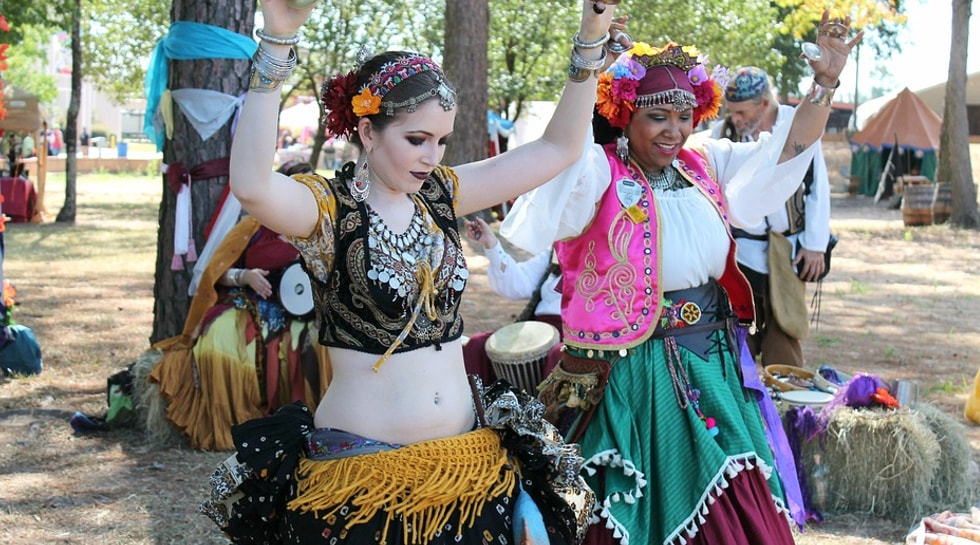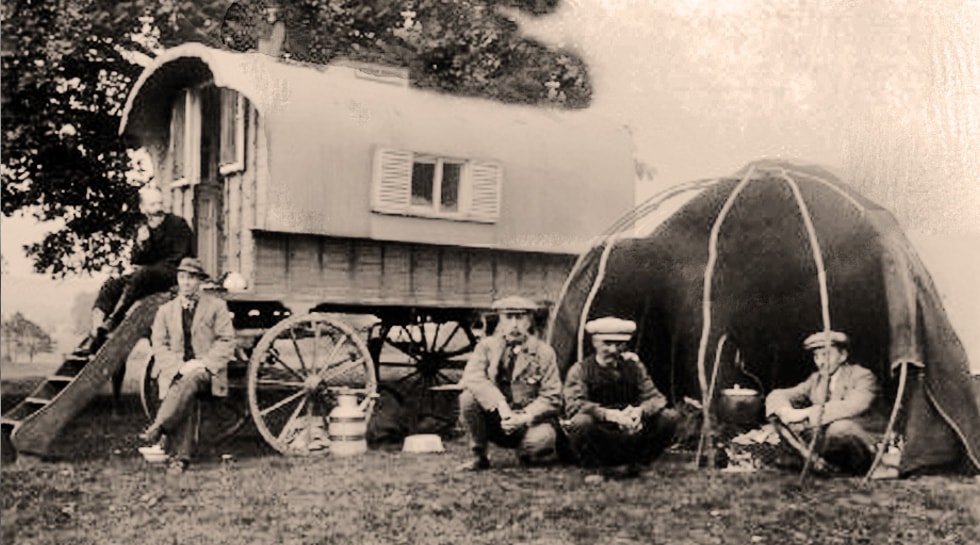Here today, up and off to somewhere else tomorrow! Travel, change, interest, excitement! The whole world before you…
Mr. Toad, Wind in the Willows
Ever since I was a small boy I have heard the word “gypsy”. To me it suggested a mysterious group who was constantly on the move; the road was their home, and they liked it that way. A gypsy was someone, so I thought, who moved about at will, and only stayed-put until it was time – for one reason or another – to move on. I confess, something about that degree of freedom made me envious.
My Dad read to me from The Wind in the Willows – perhaps the favorite book of my life. In it is described a “gipsy caravan” in terms I have always found greatly appealing: The caravan was indeed very compact and comfortable. Little sleeping bunks – a little table that folded up against the wall – a cooking stove, lockers, bookshelves, a bird-cage with a bird in it; and pots, pans, jugs and kettles of every size and variety….bacon, jam, cards and dominoes… nothing whatever has been forgotten…

This sounded to me like the ideal home; I still think so. Add to that splendid conveyance the ability to roam the world at will, and in good company… well, what could be better? So my early impressions of all things relating to gypsies were uniformly intriguing and exciting. This surely explains my love for long road-trips in our motorhome.
As I grew older, however, everyone I knew, myself included, was consumed with the idea of getting ahead – a good education, a good job, marrying well, buying a nice house and car, and producing children the envy of the neighbours.
This prospect, I figured, was fine as far as it went; but in truth, I thought it unbearably dull – totally unlikely to fulfill my dreams of travel and adventure. So, I wondered, who are these gypsy-people, exactly?
Could I perhaps join their ranks for a while? The first time I personally encountered gypsies was in the summer of ’69 when Cynthia and I rode our BSA motorcycle 3000 miles around the U.K. Here and there, on the side of a country lane we would come across a caravan attended by exotic-looking folk – dark hair, olive skin, flashing eyes, flamboyant clothes, loads of kids….

What interesting folk!” I thought. I fancied at night they made music – tambourines, fiddles, jaw harps, lutes, lyres, accordions and zithers – while eating roast boar and slurping moonshine. I made a few enquiries and found the locals called them “tinkers”, and didn’t much approve of them. “No proper sense of responsibility”, they said. That, and, I suspect, the fact they were having way too much fun for local tastes.
First of all, we must note that the people historically called “gypsies” prefer to be called Roma. The term “gypsy” arose from the fact they were once considered to be of Egyptian origin, but is today considered a slur.
The true origin of the Roma was discovered in 1763, when Stefan Valli, an alert Hungarian theology student, met people in India who resembled in appearance and language certain Roma folk he knew back home. Modern linguistic and genetic studies confirm the Roma did indeed originate in NW India, but left there in the 11th century, travelling westward. By the 15th century they had reached the Balkans.

The Roma arrived in Europe in large caravans containing their belongings. They were originally well-received there, mistaken for Christian pilgrims. Many locals were fascinated by their nomadic ways; through the years many Roma became well-known as horse-trainers, acrobats and mercenaries.
Today, the Roma comprise the largest ethnic group in Europe – about 11M. They are, like the Jews, known as a dispersed people; large populations can be found in most European countries and in the Americas. Incidentally, there are a million Roma in the U.S. and 80,000 in Canada.
Numbers relating to Roma populations are necessarily approximate; keeping track of individuals and families has been quite an administrative challenge for authorities. It’s part of the Roma nature not to cooperate with government census-taking and other perceived invasions of their privacy. The main reason for their suspicion must be their history of continual and terrible persecution.
Much has been written on Roma persecution, but suffice it to say here that they have been the victimized for many centuries. Accusations against them are along the lines of their rootlessness, insularity, law-breaking and opposition to assimilation. As well, their “squatting” tends to irritate the local gentry, as does their practice of the occult arts. The Roma are, after all, famous fortune-tellers.
From the Middle Ages until the 1850s the Roma could legally be bought and sold as slaves. Certain colonial powers deported them in great numbers to their own colonies – for instance, thousands of Roma were sent to Brazil. In 1749 the Spanish Monarchy staged the Great Gypsy Round-Up; the plan was to imprison every Roma in the country.
In the Nazi Germany, the Nuremberg Laws of 1935 stripped the Roma of citizenship, which led to a period of intense persecution called the Porajmos. This involved murder on a huge scale by S.S. death squads known as Einsatzgruppen in Eastern Europe and the Ukraine; also, many Roma – perhaps 1.3M – perished in extermination camps – Auschwitz, Sobibor and many others.
After the war, Roma continued to be persecuted in various countries; in Czechoslovakia, for instance, they were declared a “socially-degraded social stratum”, and were targeted for forced sterilization and assimilation. After the fall of communism, President Vaclav Havel, remarked, “The treatment of the Roma is a litmus test for democracy.” This attitude I find simply beautiful.
As for our supposedly-enlightened 21st century – I’m sorry to report that a degree of persecution persists to this day, for example, in France where there is much friction between the Roma, the education system and the conventional job market. I understand the problem springs from the fact that the “nomadic lifestyle” is illegal.
So, one way and another, I find the Roma fascinating, and would love to spend some time with them.
My son, Dave , suggests I might in fact be one myself – a gypsy, as it were, trapped in the body of a 70-year old retired doctor.
So, I ask, where can one hob-nob with a few Roma in a relaxed setting? Well, the answer is – at the Appleby Horse Fair held each June at Appleby-in-Westmorland, Cumbria, England. As far as I can tell, it’s an anarchic hodge-podge of magnificent horses, fun-loving Roma, and hordes of curious onlookers.
I plan to take in the fair as soon as I can. I’ll see if they do home stays.






Facebook Comments